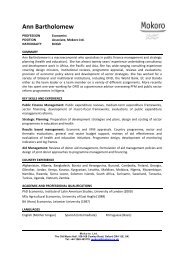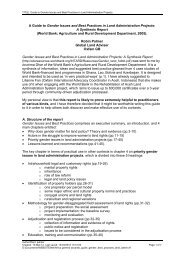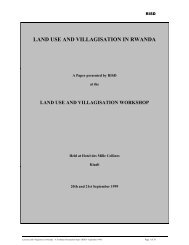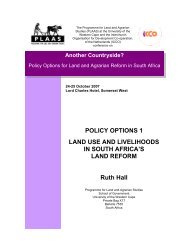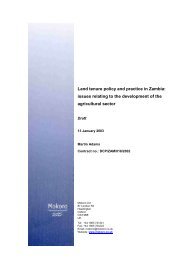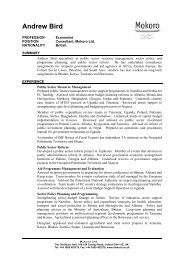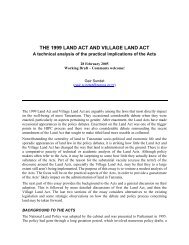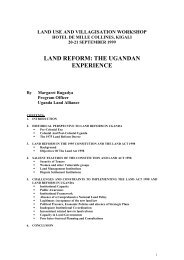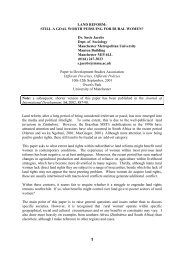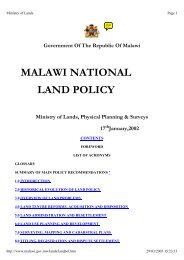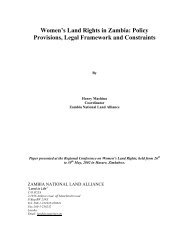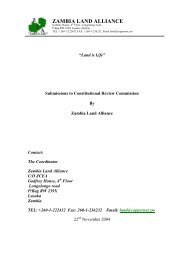Biofuels and Land Grabbing in Africa - Mokoro
Biofuels and Land Grabbing in Africa - Mokoro
Biofuels and Land Grabbing in Africa - Mokoro
You also want an ePaper? Increase the reach of your titles
YUMPU automatically turns print PDFs into web optimized ePapers that Google loves.
‘Hedge Farm! The Doomsday Food Price Scenario Turn<strong>in</strong>g Hedgies <strong>in</strong>to Survivalists’, 17<br />
May, is a great headl<strong>in</strong>e, as is ‘L<strong>and</strong> Investors Crowd the Wait<strong>in</strong>g Room’, 11 May.<br />
‘Glencore: Profiteer<strong>in</strong>g from hunger <strong>and</strong> chaos’, 9 May, offers a good analysis of the world’s<br />
largest commodity trader from Al Jazeera, cit<strong>in</strong>g Devl<strong>in</strong> Kuyek of GRAIN: ‘Glencore owns<br />
almost 300,000 hectares of farm l<strong>and</strong> <strong>and</strong> it is one of the largest farm operators <strong>in</strong> the world.<br />
They are engag<strong>in</strong>g <strong>in</strong> speculation on the gra<strong>in</strong> trade <strong>and</strong> have immense market power.’<br />
‘The surge <strong>in</strong> l<strong>and</strong> deals: When others are grabb<strong>in</strong>g their l<strong>and</strong>’, The Economist, 5 May, from<br />
The Economist, which cites papers from the IDS, Sussex l<strong>and</strong> grabb<strong>in</strong>g conference, is<br />
excellent, as is Lester Brown’s ‘The new geopolitics of food’, May/June.<br />
‘L<strong>and</strong>mark conference on l<strong>and</strong> grabb<strong>in</strong>g: large-scale agricultural <strong>in</strong>vestments do underm<strong>in</strong>e<br />
food security’, 12 April, covers the IDS conference, where <strong>in</strong> the papers ‘Not a s<strong>in</strong>gle case of<br />
positive outcomes for local communities, food security, employment <strong>and</strong> environmental<br />
susta<strong>in</strong>ability was found.’<br />
‘No easy fix. Simply us<strong>in</strong>g more of everyth<strong>in</strong>g to produce more food will not work’, 24<br />
February, is another excellent analysis from The Economist.<br />
The ‘Dakar Appeal aga<strong>in</strong>st the l<strong>and</strong> grab’ of 23 February emerged from the World Social<br />
Forum.<br />
‘Farml<strong>and</strong> comes of age for pension funds’, 2 February, <strong>in</strong>terviews Charmion McBride<br />
of Insight Investment, who believes that ‘The beauty of <strong>in</strong>vest<strong>in</strong>g <strong>in</strong> farml<strong>and</strong>, apart from the<br />
obvious connection with the world’s dem<strong>and</strong> for food, is that it represents “real” assets,<br />
rather than f<strong>in</strong>ancial ones, <strong>and</strong> its correlations with other parts of a portfolio are low.<br />
Clearly, it is a long-term <strong>in</strong>vestment, with a 10-year horizon not uncommon. It is a hedge<br />
aga<strong>in</strong>st <strong>in</strong>flation. And it is lowly correlated with equities <strong>and</strong> bond markets... l<strong>and</strong> values tend<br />
to hold up, <strong>and</strong> go up, despite the fluctuations <strong>in</strong> commodity prices. The big underly<strong>in</strong>g driver<br />
of farml<strong>and</strong> returns is, of course, the ris<strong>in</strong>g dem<strong>and</strong> for food. The production of biofuels will<br />
also kick <strong>in</strong> over the next few years, but the expected growth <strong>in</strong> the world’s population,<br />
coupled with ris<strong>in</strong>g liv<strong>in</strong>g st<strong>and</strong>ards <strong>in</strong> emerg<strong>in</strong>g countries, will place steadily <strong>in</strong>creas<strong>in</strong>g<br />
pressure on dem<strong>and</strong>...as they say about l<strong>and</strong>: they are not mak<strong>in</strong>g any more of it.’<br />
‘In Corrupt Global Food System, Farml<strong>and</strong> is the New Gold’, 13 January, is a useful<br />
summary, cit<strong>in</strong>g the views of Lester Brown (Earth Policy Institute), Anuradha Mittal (Oakl<strong>and</strong><br />
Institute) <strong>and</strong> Devl<strong>in</strong> Kuyek (GRAIN).<br />
‘Forced use of biofuels could hit food production, EU warned’, 9 November 2010 discusses a<br />
report from IEEP.<br />
‘UN expert urges action over ris<strong>in</strong>g food prices’, 1 November, carries a good <strong>in</strong>terview with<br />
Olivier De Schutter. He is also cited <strong>in</strong> ‘“Stop robb<strong>in</strong>g l<strong>and</strong> from the poorest” urges UN food<br />
expert’, 26 October, as say<strong>in</strong>g ‘You won’t solve world hunger by robb<strong>in</strong>g the poorest from the<br />
l<strong>and</strong> on which they depend: you will solve it by strengthen<strong>in</strong>g security of tenure <strong>and</strong> by<br />
ensur<strong>in</strong>g a more equitable access to l<strong>and</strong> <strong>and</strong> natural resources.’<br />
‘Invest<strong>in</strong>g <strong>in</strong> l<strong>and</strong>: the World Bank report on ris<strong>in</strong>g global <strong>in</strong>terest <strong>in</strong> farml<strong>and</strong>’, 20 September<br />
is an excellent critique by Ian Scoones.<br />
The publication on 7 September of the World Bank’s long-awaited report on l<strong>and</strong> grabb<strong>in</strong>g<br />
attracted some media attention; the F<strong>in</strong>ancial Times not<strong>in</strong>g accurately that ‘the bank walks a<br />
10



